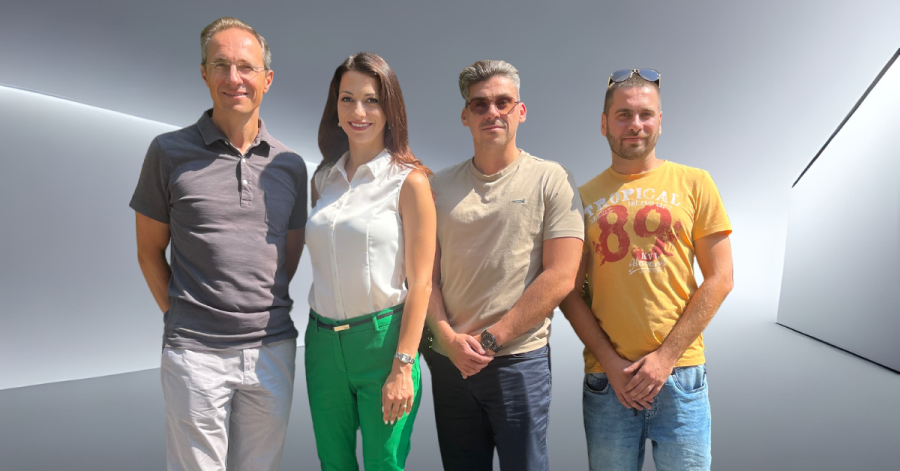- The Bulgarian mezzanine fund Silverline Capital and well known Bulgarian entrepreneurs have invested 2,600,000 EUR in Badu – a Bulgaria-based online retail store, offering a product portfolio of goods, sourced through a proprietary supply chain in China. Currently, Badu operates in Bulgaria, Greece, Cyprus and Romania.
- With the new investment, Badu plans to expand in the current markets, as well as to enter 9 new markets. The investment will also support the high-end technology development for e-commerce, including Data Analytics, Dynamic Pricing, Smart Sourcing and Product Recommendations.
- As of now, the e-commerce sector in CEE has lacked a dominant regional player offering a competitive product lineup comparable to AliExpress, but online retail stores like Badu are expected to shake up the market dynamics and change that.
Major developments are underway in the online retail landscape of Central and Eastern Europe (CEE) as Badu, a Bulgaria-based e-commerce company that offers non-branded generic goods, secures a substantial investment from Silverline Capital and its co-investors. This infusion of funds, totaling 2,600,000 EUR, marks a significant step forward for Badu’s mission to innovate online shopping in the region. The company’s goal is to challenge the current dominance of AliExpress by offering a comparable product range but with an emphasis on faster delivery, better quality, and enhanced customer service.
Diana Aladzhova, Partner at Silverline Capital highlights that the European e-commerce landscape has seen a robust compound annual growth rate (CAGR) of approximately 14.5%, with a considerable chunk of this growth attributed to the non-branded generic goods segment.
What’s more, forecasts indicate that the European e-commerce realm will reach a market value of 1.2 trillion by 2027. The customer base of e-commerce enthusiasts is also continually expanding globally and in the CEE region. For example, in 2021, the proportion of Bulgarian e-commerce shoppers compared to the overall population stood at 42%. While this figure is significant, it pales in comparison to a country like the Czech Republic, where it’s a staggering 84%. However, these disparities indicate ample room for growth in Bulgaria and its neighboring countries.
Growth potential, scalable software capabilities and supply chain, and a thorough understanding of the e-commerce landscape were what Silverline Capital was looking for and Badu immediately stood out.
“We provided them with a comprehensive Pitchbook report on e-commerce market trends. Within a remarkably short period, Badu responded with detailed solutions aligned with each trend. Their ability to swiftly and accurately strategize for these trends provided us with great confidence,” Diana Aladzhova, Partner at Silverline Capital, says for The Recursive.
Aladzhova notes that if the CEE region wants to lead the way in a highly competitive sector like the e-commerce one, online retail companies shouldn’t be focused exclusively on their current operations. Instead, they need to be forward-thinking in their approach, aiming to align with upcoming industry shifts, including both the brick and mortar supply chain and the digital experience – an adaptability and flexibility that Sivlerline spotted at Badu.
Becoming Badu
Badu was founded in 2015 by Kiril Shopov who was later joined by Anton Chapov. Shopov resided and worked in London from 2007 until 2014, occupying diverse roles. This period ignited something in him and played an instrumental role in shaping his perspective.
“The initial seeds of my entrepreneurial spirit were sown when I commenced my journey as a door-to-door salesman. To this day, I consider this role a pivotal experience that granted me profound insights into the art of selling”, Shopov says, reflecting on his early years.
After gaining his Master’s degree in business management, Shopov ventured into the world of online retail and created several websites – one for selling paintings in Bulgaria and another for providing construction safety certificate courses required in the UK. These failed but what’s more important is that Shopov recognized that the e-commerce realm was indeed his calling and he decided to pursue his passion back in his home country where his co-founder, Anton Chapov, joined him.
“Returning to Bulgaria, I was armed with the vision of launching an e-commerce business. I had known Tony (Anton Chapov) for some time, having grown up in the same town – Petrich. Recognizing his prowess in programming (a skill that has since transformed him into a master), I was confident he could construct the website I envisioned. Despite operating with a modest budget of around 2,500 leva, Tony agreed to create an e-commerce platform akin to giants like eBay and Amazon,” Shopov tells The Recursive.
In a span of around 18 months, the two co-founders managed to establish a functional online marketplace. But making it really successful was harder. Armed with his sales expertise, Shopov reached out to various online and physical sellers, urging them to join their platform for enhanced sales. Concurrently, at that time he was partnering with someone else and together they amassed a significant product portfolio. But while the website generated some sales, it was far from the level needed to sustain disproportionate growth.
The real turning point came when his previous partner explored China’s thriving e-commerce scene, which led to a transformative insight: “Instead of offering Bulgarian products to Bulgarian customers, we decided to source Chinese products and sell them to our Bulgarian clientele. The result was an almost instantaneous triumph. Our business model evolved out of necessity, centered around ensuring successful order execution”, Shopov shares with The Recursive.
Amid these shifts, Shopov’s previous partner stepped back, and Anton Chapov stepped in, becoming an owner.
Badu’s market differentiation
Badu distinguishes itself through a range of key advantages that cater to its customer base seeking enhanced value when shopping from China.
“Shopping with a mammoth entity like AliExpress can sometimes lead to complexities and uncertainties. What sets us apart is the assurance we offer – a promise that when you shop for the types of products we specialize in, we’ll manage all the intricacies for you. Our commitment is to provide hassle-free and prompt doorstep delivery. Our swiftness in delivery is noteworthy, outpacing the likes of AliExpress. Furthermore, we pride ourselves on delivering local customer service, enabling you to converse in your native language with a dedicated representative for any queries or concerns,” Shopov explains.
Additionally, the return process of Badu mirrors that of local e-commerce platforms, and notably, we cater to the preferred payment method in the CEE region – paying upon delivery.
“Adding to our differentiation is our ownership of a fulfillment center in China. This grants us the capacity to inspect product quality before dispatch, a capability that diverges from AliExpress’ reliance on a seller rating system, which can sometimes fall prey to technical glitches and result in problematic orders,” Shopov clarifies.
Badu’s product sourcing originates from China, allowing them to quickly bring new products to market. Standard e-commerce businesses often contend with bulk purchases and imports, necessitating substantial investments and intricate forecasting models to predict winners from the sheer multitude of new products annually. Badu overcomes this challenge because as soon as a product debuts in China, they can make it available on their platform and deliver it within 15 days of ordering.
Badu’s technology
As an e-commerce company, Badu is well aware that in the realm of larger e-commerce platforms, effective personalization technologies are paramount for success. Algorithms tailored to personalization have a proven positive impact on the shopping experience and performance outcomes.
“Such was the case for us, when we first introduced these algorithms to the website, conversion levels immediately improved. The customers were now seeing relevant products, instead of randomly chosen. All technologies in the industry act in a similar way – they all try to understand the customer’s needs better and build a personal offering and experience that is relevant to the specific customer. Dynamic Pricing is also a similar tool, where product pricing is algorithmically calculated in real time based on previous customer interactions,” Kiril Shopov explains.
As a whole, the company’s technological philosophy revolves around prioritizing simplicity and efficiency, standing in contrast to the intricate web of high-tech solutions pervasive in the e-commerce landscape. And when it comes to the people behind the technology, Badu places strong belief in the efficacy of lean and agile teams. Currently, the company runs a small tech team but they are looking to expand significantly in the coming months.
Additionally, Shopov highlights the well-established truth that the larger you grow, the more cumbersome it becomes to overhaul your technological infrastructure. In the case of Badu, the team enjoys the flexibility to swiftly explore and implement innovative technologies:
“Our agility permits us to harness the latest advancements and technologies in the industry, at a fraction of the cost incurred by industry behemoths. The current development in AI will allow for even further personalization, since these models can be interactive. AI will be a game changer for the industry, and this is well known among the players. It is a matter of who will do a better job of exploiting it. At Badu, we are closely monitoring all the latest developments and are currently strategizing on the best way to adopt the technology. It is important to not rush as the rate of development of AI technologies is very high,” Shopov comments.
Investing in the next big thing
“Silverline Capital has had its eye on the e-commerce sector for approximately two years now. Our perspective is that to truly lead in e-commerce, a company needs to have a solid foundation built on four key pillars,” Diana Aladzhova, Partner at Silverline Capital, justifies their decision to invest in Badu.
According to the investors, foremost, a distinctive and diversified product portfolio plays a pivotal role in setting the company apart from competitors. Coupled with this, a solid digital marketing strategy stands as a vital tool, serving as the primary avenue to attract and engage new customers. A third essential component is the implementation of scalable e-commerce software, capable of accommodating the growth of both products and orders. However, none of these factors can thrive without the foundation of a robust and scalable supply chain. The interplay of these pillars is crucial, and any weak link raises significant concerns about the model’s scalability and potential for success.
“In this context, Badu stood out to us. They demonstrated a clear vision and a track record of excelling in all four of these areas. Furthermore, all of these aspects were thoroughly examined, and their alignment greatly strengthened our investment thesis. This alignment also played a crucial role in attracting other prominent co-investors, several of whom hold esteemed reputations as high-achieving entrepreneurs in the e-commerce domain,” Aladzhova comments.
What’s next for Badu?
Badu plans to expand in the current markets it operates in as well as to enter 9 new markets, including Hungary, Poland, Slovakia, Croatia, the Czech Republic, Slovenia, Lithuania, Latvia, and Estonia.
“As we venture into these new territories, we understand that each comes with its distinct cultural norms and consumer behaviors. Adhering to these nuances presents a substantial challenge, but it’s also a critical element for success. Our strategy involves meticulously studying the local consumer habits and tailoring the shopping experience to align with their preferences. Our brand identity is deeply intertwined with this endeavor. The essence of our service lies in delivering a local experience within the realm of transcontinental commerce,” Kiril Shopov says.
To achieve that, the company is establishing dedicated R&D teams to ensure their offerings harmonize seamlessly with each market’s unique characteristics.
“We’re focused on expanding our product portfolio substantially beyond its current breadth. Collaborating with these partners, we’re poised to be pioneers, embracing emerging technologies that have the potential to revolutionize the industry,” Shopov concludes.








